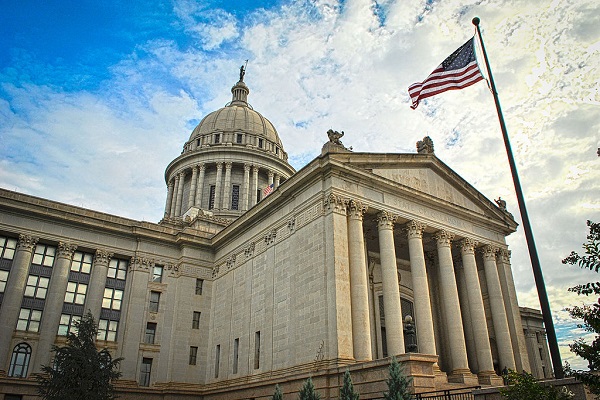
Will Oklahoma Voters Allow Religious Displays at State Capitol?
- By Kelly Frazier --
- 03 Nov 2016 --
![James Johnson [CC BY-SA 3.0], via Wikimedia Commons](https://www.worldreligionnews.com/wp-content/uploads/2016/11/1024px-Oklahoma_State_Capitol_Building.jpg)
If the ballot initiative passes, more religious groups will ask for permission to erect public monuments, including a Hindu Lord Hanuman statue.
On November 8, as Oklahoma voters go to the ballot and play a role in electing the next president of the United States, they will also be dealing with a contentious issue that threatens to embroil the state of Oklahoma in a hot soup of lawsuits. State Question (SQ) 790 is a piece of legislation authored by among others, State Representative John Paul Jordan, R-Yukon. SQ790 aims to repeal Article 2, Section 5 of the Oklahoma constitution, further blurring the line between church and state.
Will Oklahoma Voters Allow Religious Displays at State Capitol?[/tweetthis]
Article 2, Section 5 of the Oklahoma constitution states: “No public money or property shall ever be appropriated, applied, donated, or used, directly or indirectly, for the use, benefit, or support of any sect, church, denomination, or system of religion, or for the use, benefit, or support of any priest, preacher, minister, or other religious teacher or dignitary, or sectarian institution as such.”
SQ790 arises out of the Oklahoma Supreme Court decision in 2015 that ordered the removal of a private monument of the Ten Commandments on the grounds of the Capitol. This is not the first time the Supreme Court has relied on Article 2, Section 5 to make rulings touching on the state and religion. The court has made different rulings in 1946, 1959 and 1963.
SQ790 is publicly supported by OCPA Impact, a political advocacy branch of the Conservative Oklahoma Council of Public Affairs. Dave Bond, CEO of OCPA Impact remarked, “It’s antiquated, bigoted language that really has no place in our laws here in Oklahoma today. While this ballot question has the public’s attention primarily because of the Ten Commandments monument, there’s a whole lot more state government spending and state government programs that are in real jeopardy as long as this language remains in our state’s Constitution.”
The American Civil Liberties Union and the Oklahoma Chapter of Americans United for Separation of Church and State are among the parties publicly opposing SQ790. Allie Shinn, director of the strategic initiatives at the Oklahoma’s Chapter of the American Civil Liberties Union commented, “We’re just taking away one of the protections we have for one of our fundamental and guaranteed rights. A vote against 790 is a vote in favor of religious freedom. The Legislature has not really been great at protecting our religious freedom, and we should not embolden them further.”
@billmaher Lord Hanuman and Nevada Hindu group seek monument at Oklahoma capitol (contra chapel proposed by Speaker). pic.twitter.com/26v0ixSE0W
— TheRealPinth-Garnell (@pinth_garnell) December 11, 2013
While SQ790 arises from the decision to remove the Ten Commandments monument in 2015, there is the worry if this ballot initiative passes, more religious groups will ask for permission to erect more public monuments and file lawsuits if their request is denied. This is immediately evident in the statement made by Hindu statesman Rajan Zed. Zed says if the Oklahoma State Capitol becomes open to more monuments, the Hindu society would very much want to erect a statue of Lord Hanuman. This would make the statue the first Hindu religious monument on public land in the country.
There are more than thirty states in the U.S.A. which have similar provisions and constitutional barriers like Article 2, Section 5 which are aimed to limit public spending on religious matters, as well as maintaining the barrier between Church and State. The most widely known and revered barrier is the First Amendment of the U.S Constitution. The First Amendment expressly forbids Congress from enacting any law “respecting an establishment of religion, or prohibiting the free exercise thereof.”


















